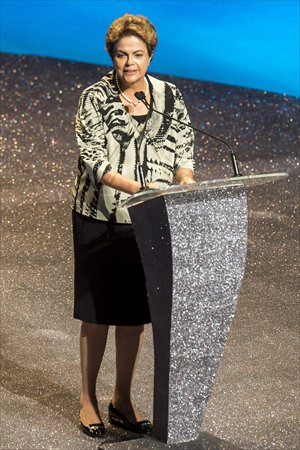HOME >> SPORTS
Rio enters one-year sprint to Olympic Games
Source:AFP Published: 2015-8-7 5:03:03
All construction work ‘on schedule’

Brazilian President Dilma Rousseff gives a speech during a ceremony for the one-year countdown to the 2016 Olympic Games in Rio on Wednesday. Photo: IC
The one-year countdown to the Rio Olympic Games began Wednesday with officials promising to overcome Brazil's usual chaos in a Summer Games that will transform the city and thrill the world."All the construction work is on schedule," Rio Mayor Eduardo Paes told journalists in a nearly finished arena inside the giant Olympic Park building site.
With 12 months left to complete the challenge, it's like "the end of a marathon," he said.
At a ceremony, visiting International Olympic Committee chief Thomas Bach praised the preparations, while President Dilma Rousseff vowed Brazil would "delight" the world.
On August 5, 2016, the Olympic torch will end its own marathon - being flown around the globe and carried by 12,000 people through Brazil - when it lights the flame for the opening ceremony in Rio's Maracana stadium.
Carlos Nuzman, president of the Rio Olympic organizing committee, reeled off figures illustrating the scope of the world's biggest sporting event - and of Rio's commitment.
There will be 206 countries and regions represented - the newest being recently recognized South Sudan - and 10,500 athletes competing in 42 sports over 17 days. Right after, the Paralympic Games will see 4,350 athletes from 176 countries and regions in 23 sports.
To face the onslaught, Rio is assembling the equivalent of eight soccer fields of sporting gear - "a million items," Nuzman said - and 45,000 volunteer workers, with 25,000 on call for the Paralympic Games.
"We are continuing to work, because there is still much to do," Rousseff said.
Pollution scandal
This will be the first Olympic Games held in South America and a chance for Brazil, the world's seventh-largest economy, to look beyond a growing domestic brew of corruption and economic trouble.
Already the Olympic Park is 82 percent ready and Olympic Village 89 percent complete, Paes said.
But the generally positive picture darkens in what environmentalists and Rio residents describe as the horrific pollution in Guanabara Bay, where sailing and windsurfing contests will take place.
Environment experts say most of the sewage produced by the 12 million people in greater Rio goes untreated directly into the bay.
In addition, dozens of rivers leading to the bay are filled with garbage.
In its original bid to host the Games, one of Rio's promises was to reduce that pollution by 80 percent - a goal that no one now even pretends can be met.
Officials are on the defensive and on Wednesday they once more insisted that there was no danger to athletes' health or to their boats.
"The sailing athletes will be protected," Paes said, estimating that pollution had already been reduced by 50 percent and "probably" will reach 60 percent by the Games.
Changing Rio for good
There are debates over whether the Olympic Games is good for cities or burdensome vanity projects, but in Rio the occasion has been an opportunity to escape decades of underinvestment, Nuzman said.
"No city has had the transformation of its infrastructure as has Rio," he said.
Paes said that Rio had made an attractive candidate city not because of all its infrastructure but the fact it had so little - and could use the Games to improve.
The biggest positive change will be in transport, linking up a sprawling city where the metro currently only serves a narrow strip and it can take hours in traffic to go from the center to the Olympic Park.
A new metro line and dedicated lanes for express buses are on track to consign those nightmare journeys to memory, officials say.
But Paes, a flamboyant politician said to have presidential ambitions, went beyond municipal matters, stating that a good Games will show the world a new Brazil.
"There will be a legacy to create in this country a culture that things can
be done on time," he said, calling Brazil "a country where everything is delayed, everything is beyond its budget."
"We want to show the other side," he said, joking that tropical Rio might even feel ready to "bid for the Winter Games."
"Who knows if climate change will let us do that?"
Posted in: Feature, Olympics